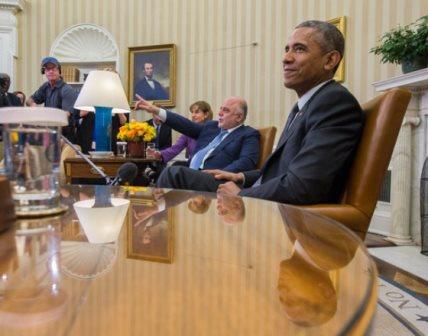
WASHINGTON — President Obama gave Haider al-Abadi, the prime minister of Iraq, a full-throated endorsement and $200 million in humanitarian aid on Tuesday, but the visiting leader left the White House still in need of billions more dollars to cope with plunging oil prices and a yawning budget deficit.
After a 40-minute meeting that touched on war and sectarian divisions, Mr. Obama publicly credited Mr. Abadi with helping to turn the tide in the battle against the Islamic State extremists who seized much of his country last year and expressed confidence that the new Shiite-led government in Baghdad was doing more to include Sunni and Kurdish minorities.
“Although there is the natural back-and-forth that exists in any democracy, Prime Minister Abadi has kept true to his commitments to reach out to them and to respond to their concerns and to make sure that power is not solely concentrated within Baghdad,” Mr. Obama told reporters, with Mr. Abadi seated next to him in the Oval Office. He called Mr. Abadi “a strong partner” who has “gained the respect of other leaders in the region.”
Mr. Abadi assured Mr. Obama that he was cracking down on abuses. “I have to admit that there are some violations, human rights violations, being committed by some criminal parties and outliers, but we have zero tolerance for any violations of human rights,” Mr. Abadi said. “And when we manage to catch these people, we are bringing them before the judicial system and we punish them.”
Mr. Obama hoped to use the meeting to reinforce America’s role in helpingIraq and building up Mr. Abadi’s control of the war against the Islamic State, even as Iran directs Shiite militias in Iraq that are independent of the government. Iran’s role was “discussed extensively,” the president said, and he insisted that “any foreign assistance” in the war “has to go through the Iraqi government.”
Mr. Abadi agreed. “We are also keen to bring all fighters under the control of the state and under the command of the commander of the armed forces,” he said.
In recognition of the civilian damage wrought by recent fighting around Tikrit and elsewhere, Mr. Obama committed $200 million to “help stabilize communities and to help those who have been displaced from their homes, have lost their jobs, have seen their property destroyed.”
But that represented only a small fraction of what Mr. Abadi came to Washington seeking to secure. The prime minister plans to meet on Thursday with Christine Lagarde, the managing director of the International Monetary Fund, and with Jim Yong Kim, the president of the World Bank. He also plans to meet with senior executives from oil companies and international banks, including Citibank and Deutsche Bank.
Iraq is facing a budget deficit this year of $22 billion, a sizable gap in a total budget of $105 billion. Oil revenue, which accounts for a vast majority of government income, has declined at the same time that the Iraqi government is facing the challenge of restoring essential services and rebuilding towns and cities damaged in the fighting against the Islamic State.
Iraqi officials are counting on substantial international support. That includes the ability to draw on more than $2.4 billion in the currencies of some of the strongest members of the International Monetary Fund and $2 billion in assistance from the World Bank.
Iraq would also like to obtain substantial loan guarantees from the Export-Import Bank of the United States to finance the purchase of Boeing planes for Iraqi Airways.
Mr. Obama said that the United States was “paying attention to the economy of Iraq” and how it could maximize its oil resources and diversify its assets, but he made no specific commitment beyond the humanitarian aid.
Mr. Abadi, who became prime minister in September, has appealed for economic support before. In a December meeting in Brussels, he asked for international help in rebuilding towns and cities that his government hoped to wrest from the control of the Islamic State.
Secretary of State John Kerry said at the time that he expected Saudi Arabia and other oil-rich Arab states to provide most of the money, though he indicated that the United States would contribute. It was unclear what headway had been made toward lining up donors.
Mr. Abadi’s trip comes at a pivotal moment. After retaking Tikrit, Saddam Hussein’s hometown, with the help of American airstrikes, Iraq faces important questions about the course of the campaign against the Islamic State, the scale of the American effort in Iraq over the next year, and how to handle Iran’s military role in training and advising Shiite militias.
Mr. Abadi made a point of thanking Americans for their help, even as he sought more. “The American people have made great sacrifices for the sake of Iraq, and the blood of its sons and daughters is mixed also with the blood of the Iraqis,” he said. “But I can assure you that these sacrifices will not go to waste.”
Mr. Abadi also met with Vice President Joseph R. Biden Jr. and had a schedule of other meetings with Mr. Kerry and Defense Secretary Ashton B. Carter. He will also see the House speaker, John A. Boehner, Republican of Ohio; the Senate majority leader, Mitch McConnell, Republican of Kentucky; and other ranking lawmakers. He will appear at a think tank and a U.S. Chamber of Commerce reception and give a series of interviews.
On Tuesday, Mr. Abadi was scheduled to meet with Iraqi pilots who are being trained in the United States to fly F-16s. Iraqi officials said that 14 pilots were scheduled to be trained by September, when the Iraqi military hopes to start flying the planes in Iraq.
original source: http://www.nytimes.com/2015/04/15/world/middleeast/iraqi-prime-minister-haider-al-abadi-in-washington.html?_r=0
